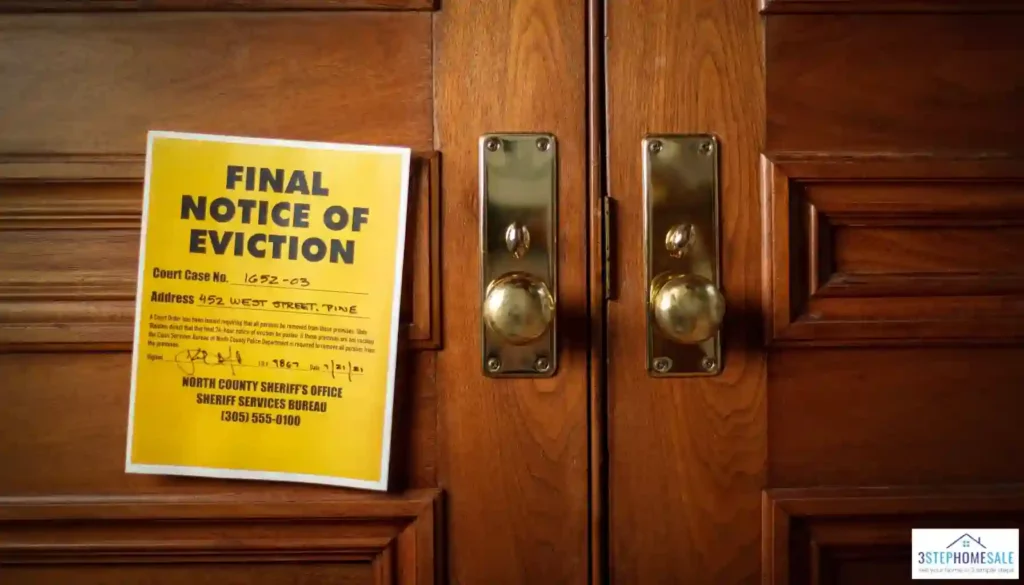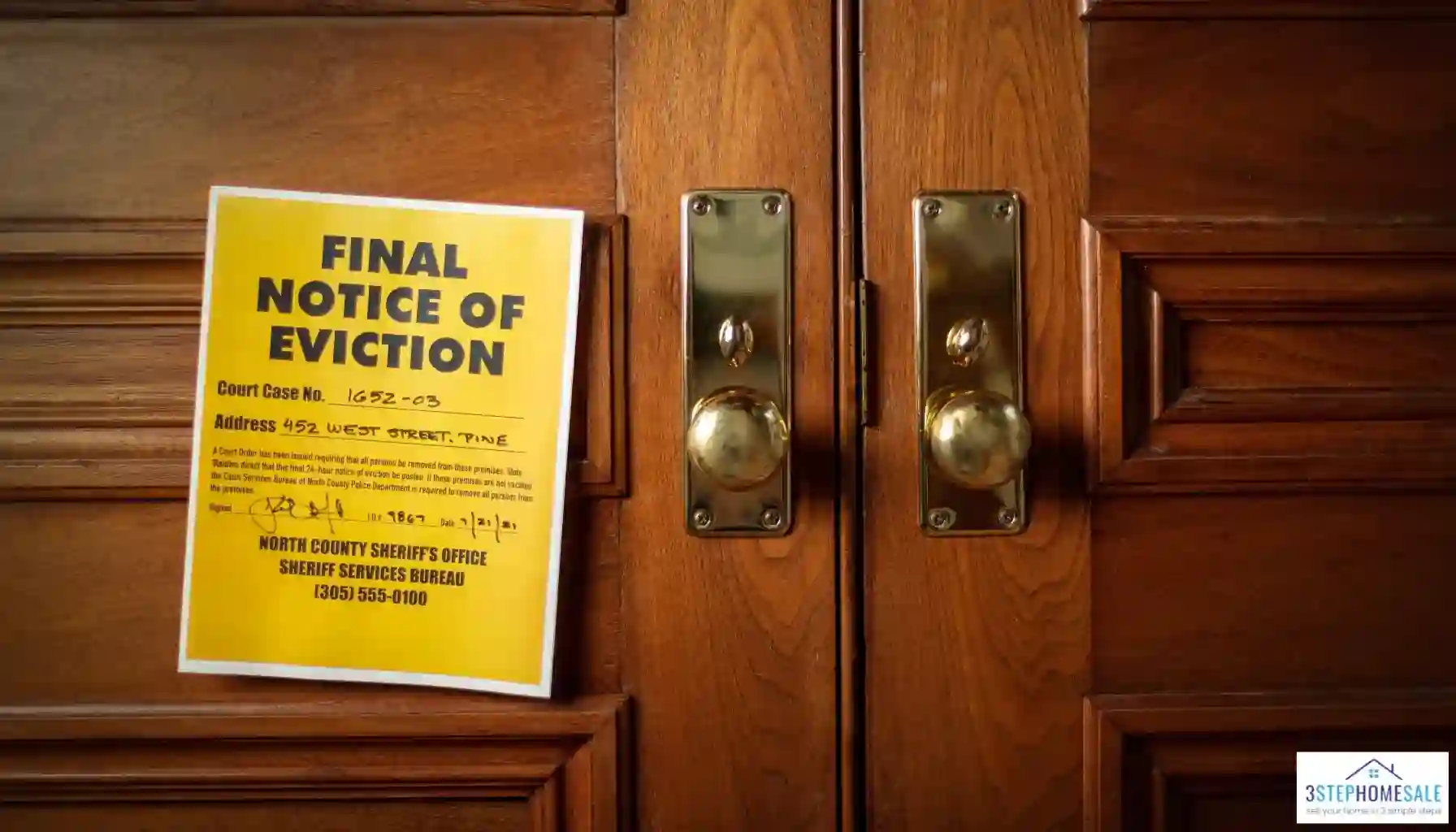
Can I Evict a Tenant to Sell My House?
Yes, you can evict a tenant to sell your house, but it depends on your lease agreement and state laws. If the tenant’s lease has expired or they’re renting month-to-month, you can usually end the tenancy with proper written notice, typically 30 to 60 days in Maryland. However, if the tenant still has time left on their lease, you generally can’t evict them just because you want to sell; the new owner would have to honor the existing lease until it ends. Eviction is only allowed sooner if the tenant has violated the lease, such as by not paying rent or damaging the property.
With 3 Step Home Sale, you don’t have to worry about evicting tenants before selling. We buy homes as-is, whether they’re vacant or occupied, and handle all the tricky parts for you. No waiting for leases to end, no messy evictions, and no stress about repairs or agents. You get a fair cash offer, a fast closing, and the freedom to move on while we take care of everything behind the scenes.
Get An Offer Today & Pick Your Close Date
Fill Out the Form and Our Team Will Call With Your Offer
Landlord-Friendly vs. Tenant-Protective States Explained
Eviction laws in the U.S. are governed at the state and local levels, and many cities have additional tenant protections layered on top. Here’s how it varies:
Landlord-Friendly States
- Allow eviction with minimal notice for month-to-month leases.
- Do not require “just cause” to terminate tenancy.
- Eviction timelines are often shorter (21–45 days from notice to lockout).
Tenant-Protective States
- Require “just cause” for eviction, even on month-to-month agreements.
- Have rent control ordinances that limit lease terminations.
- Some cities, like San Francisco or Los Angeles, require relocation assistance if the eviction is for sale.
Can you evict tenant to sell house? You can, if you do it in compliance with your lease terms and local law. Always review your area’s specific landlord-tenant regulations before moving forward.
How to Evict a Tenant When Selling a House: Step-by-Step
To evict a tenant when selling a house, you must follow your state’s landlord-tenant laws. Once you’ve confirmed that you’re legally allowed to pursue eviction, follow these steps to ensure compliance and reduce risk.
1. Review the Lease Agreement
Start by examining the lease in detail. Focus on:
- Type of lease (fixed-term or month-to-month)
- End date and renewal clauses
- Any early termination provisions
- Required notice periods
Example: A tenant on a lease ending in 60 days may be easier to remove with a non-renewal notice. But if there are 9 months remaining on a fixed-term lease, you may not be able to evict for the sale unless you have just cause or offer to buy the lease out.
2. Provide Legal Notice
To proceed with an eviction, you must deliver a formal notice to vacate. This written notice should clearly state the termination date and comply with the legal minimum notice period, which is typically 30, 60, or 90 days. In some states, it must also include a valid reason, such as the property being sold. It’s important to serve the notice correctly, such as via hand delivery, certified mail, or posting as improper service can invalidate the eviction process.
3. Consider Offering “Cash for Keys”
One of the most effective strategies especially when eviction is not legally straightforward is to negotiate with the tenant. In a “cash for keys” arrangement:
- You offer money (e.g., $1,000–$5,000) in exchange for the tenant agreeing to move out voluntarily by a specific date.
- You both sign a written agreement outlining the terms.
- You avoid court proceedings, legal fees, and the risk of property damage.
This method is especially useful in areas with strict eviction laws.
4. Maintain Professional Communication
Selling a home can be an emotional experience for both you and your tenant, so clear, respectful communication is key. Be upfront about your intentions, give tenants time to ask questions or express concerns, and consider offering assistance with moving logistics or referrals to other rentals. When tenants feel respected, they’re more likely to cooperate, even if they’re unhappy with the situation.
5. File for Legal Eviction (If Needed)
If the tenant refuses to leave after notice or cash-for-keys negotiations fail:
- File a formal eviction complaint in housing court
- Attend a hearing and present documentation
- Wait for a judgment and writ of possession
- Coordinate with the local sheriff for final removal
Warning: Never attempt to “self-evict” a tenant by changing locks, shutting off utilities, or harassing them. These are illegal and can result in major penalties.
Can You Evict a Tenant If You Want to Sell the House?
This is one of the most frequently asked questions by landlords looking to sell and the answer isn’t always straightforward. Here are the three key factors that will determine your options:
A. The Type of Lease
- Month-to-Month Lease: These are easier to end. In most places, you just need to give the tenant written notice, usually 30 or 60 days, before asking them to move out.
- Fixed-Term Lease: This is a lease with an end date (like one year). You usually can’t make the tenant leave before the lease ends, unless they agree to move out early. Sometimes, you may need to offer money or other help to get them to leave sooner.
B. Your Local Laws
Every state and city has different rules about ending a lease. Some areas only allow you to ask a tenant to leave if you have a good reason, called “just cause.” Just selling the house might not be enough, unless:
- You or the buyer plan to move into the home
- You’re taking the home off the rental market for good
Breaking these rules could lead to delays, fines, or even legal trouble. It’s a good idea to talk to a local real estate expert or lawyer.
C. Who You’re Selling To
Who buys the house also matters. If you’re selling to another landlord or a cash home buyer, they might be happy to keep the current tenant. In that case, there’s no need to evict anyone.
But if your buyer wants to live in the house, they’ll usually want it to be empty. You’ll need to plan ahead to make sure the home is vacant before the sale closes.
What Not to Do When Removing Tenants
To protect yourself from legal and financial trouble, avoid these common mistakes:
Illegal Self-Eviction Tactics
- Locking out the tenant
- Shutting off power, water, or gas
- Removing doors or windows
- Verbal threats or intimidation
These actions violate tenant rights and may lead to:
- Lawsuits for illegal eviction
- Tenant damages (e.g., 2–3 times rent)
- Delays in selling the property
Legal Best Practices
- Always use written notices
- Keep records of all communication
- Stick to your state’s notice periods
- Work with a landlord-tenant attorney if unsure
Also, make sure your actions don’t violate Fair Housing Laws, which prohibit discrimination based on race, gender, religion, family status, disability, and more.
Final Thoughts
Selling a rental property with tenants can be a complex legal challenge but it’s manageable with the right knowledge and approach. Whether you’re legally terminating a lease or choosing to sell with tenants in place, always act in accordance with the law and strive to preserve positive tenant relations.
If you’re in Maryland areas and want to sell without dealing with evictions, costly repairs, or difficult tenants, 3 Step Home Sale provides a simple, legal, and efficient solution to move forward.
Frequently Asked Questions
Can I evict a tenant if I want to sell my house?
Yes, you can evict a tenant to sell your house, but you must follow your state’s landlord-tenant laws. The process usually requires giving written notice — typically 30 to 90 days depending on the lease. Evicting without proper notice can cause legal delays and jeopardize your sale.
How do I legally evict a tenant to sell my property?
Start by reviewing your lease and state laws, then give formal written notice explaining your intent to sell. If the tenant refuses to move, you may need to file an eviction through your local court. Working with a real estate attorney helps ensure the process is legal and avoids costly mistakes.
Can my tenant refuse to move out if I’m selling the house?
Yes, a tenant can refuse to leave if they have a valid lease or haven’t been given proper notice. You can’t force them out, but you can pursue legal eviction or negotiate a move-out agreement. Staying professional and documenting all communication helps protect your rights.
What’s the best way to get a tenant to move out quickly without going to court?
Offering “cash for keys” is often the fastest, most peaceful way to get a tenant to leave voluntarily. It involves paying or assisting the tenant in exchange for an agreed move-out date. This avoids court delays, saves money, and allows you to sell the house sooner.
Still Have Questions? Visit our FAQ page.
Sell Your House As-Is In:
Silver Spring | Germantown | Upper Marlboro | Waldorf | Severna Park

